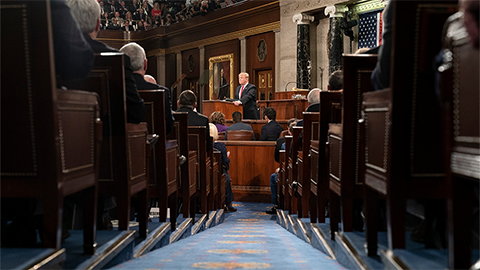In State of the Union, Trump misrepresents administration’s support for medical research
President Donald Trump used a portion of last night’s State of the Union address to whitewash his administration’s attempts to undermine and defund science. Roughly three-quarters of the way through the speech, he said:
Read the ASBMB's response
“President Donald Trump took a revisionist look back at his administration’s support for biomedical research that leads to life-saving breakthroughs." Read more.
“We have launched ambitious new initiatives to substantially improve care for Americans with kidney disease, Alzheimer's, and those struggling with mental health challenges. And because the Congress funded my request, we are pursuing new cures for childhood cancer, and we will eradicate the AIDS epidemic in America by the end of the decade.”
Specifically attention-grabbing to me was “And because Congress funded my request.”
Let’s be very clear about the president, his record on funding biomedical research, and what the status of funding is.
Today, the National Institutes of Health operates at an annual budget of $40.2 billion. That is the fiscal year 2020 enacted level, approved by Congress and signed into law by Trump in late 2019. The $40.2 billion marked a $2.6 billion (6.6%) increase over the fiscal 2019 enacted spending level.
Trump’s budget request for fiscal year 2020 for the NIH was $34.4 billion. This number represented a $4.9 billion (12.6%) cut from fiscal 2019 enacted levels. With the lone exception of buildings and facilities, under Trump’s fiscal 2020 budget request, all institutes, centers and budget activity would have been cut.
It was Congress, with strong bipartisan support, that rejected Trump’s budget request and funded the NIH at a level 22% above the administration’s budget request for fiscal 2020.
This is the story and the legacy of the Trump administration as it relates to funding for medical research that leads to cures and breakthroughs.
For fiscal 2019, Trump’s initial budget request called for a 27% cut to NIH funding — and it was followed by a supplement that reversed the cuts and requested level funding.
Trump’s first budget request in 2017 called for a 22% cut to the NIH, which would have brought NIH funding to its lowest level since 2002. Once again, these cuts were rejected by a Congress supportive of investments in medical research.
Before last night’s State of the Union, I wrote about how Trump has largely left science out of his previous addresses to Congress. In his previous speeches, while he had spoken more than 16,000 words, he mentioned science, research and cures only six times. I argued that the lack of rhetoric from the president supporting science in his speeches matched the lack of support science has seen from this administration.
One section of one speech does not make the president a champion of biomedical research or innovation. Unless and until we see demonstrated changes in the administration’s attitude toward investing in life-saving research, we are left with few options other than seeing the president’s comments as opportunistic and an attempt to gloss over just how uninterested he is in supporting American innovation and the NIH.
Enjoy reading ASBMB Today?
Become a member to receive the print edition four times a year and the digital edition monthly.
Learn moreGet the latest from ASBMB Today
Enter your email address, and we’ll send you a weekly email with recent articles, interviews and more.
Latest in Opinions
Opinions highlights or most popular articles

Women’s health cannot leave rare diseases behind
A physician living with lymphangioleiomyomatosis and a basic scientist explain why patient-driven, trial-ready research is essential to turning momentum into meaningful progress.

Making my spicy brain work for me
Researcher Reid Blanchett reflects on her journey navigating mental health struggles through graduate school. She found a new path in bioinformatics, proving that science can be flexible, forgiving and full of second chances.

The tortoise wins: How slowing down saved my Ph.D.
Graduate student Amy Bounds reflects on how slowing down in the lab not only improved her relationship with work but also made her a more productive scientist.

How pediatric cataracts shaped my scientific journey
Undergraduate student Grace Jones shares how she transformed her childhood cataract diagnosis into a scientific purpose. She explores how biochemistry can bring a clearer vision to others, and how personal history can shape discovery.

Debugging my code and teaching with ChatGPT
AI tools like ChatGPT have changed the way an assistant professor teaches and does research. But, he asserts that real growth still comes from struggle, and educators must help students use AI wisely — as scaffolds, not shortcuts.

AI in the lab: The power of smarter questions
An assistant professor discusses AI's evolution from a buzzword to a trusted research partner. It helps streamline reviews, troubleshoot code, save time and spark ideas, but its success relies on combining AI with expertise and critical thinking.


